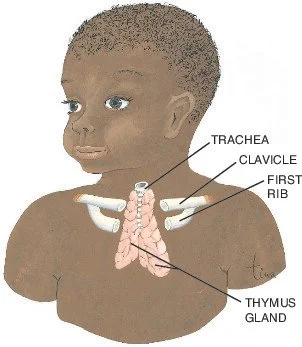ANATOMY: THYMUS
Thymus vulgaris (Common Thyme)
(Source: Science Photo Gallery)
Thymus gland in a young child
(Source: Taber’s Medical Dictionary)
The name THYMUS (both plant and organ) likely stems from a shared Greek root - THUMOS - meaning courage, soul, or spirit. The role of the thymus, an immune organ, was long thought to differentiate SELF from NON-SELF, but with the better understanding and greater prevalence of autoimmune diseases (for which the thymus plays a crucial role in prevention), such differentiation is no longer tenable. A recent paper titled The thymus and science of self takes a deeper look at its development and proposed function. It is unique in its growth pattern— it is largest in infancy, and shrinks into adulthood.
The ancient Greeks used thyme medicinally for its antimicrobial and antioxidant qualities, ritualistically in ceremony, and culinarily as a common kitchen herb. Its use in cuisine and in medicine continues in the Mediterranean and beyond. I was not surprised to find a growing body of research suggesting its potential benefit in several autoimmune conditions, though most papers are preliminary and adequate studies in human subjects are so far lacking.


